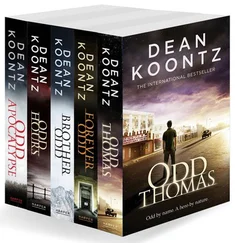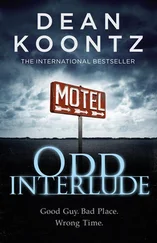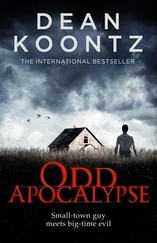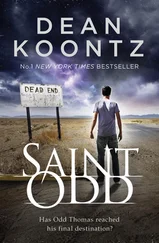Moving forward, I said, “I am not yours. You will leave now.”
They seemed to think that I was mistaken, that I was indeed theirs, that they had seen the menu with my name on it, and their bodies pressed against my legs.
Annamaria had quoted Shakespeare: Virtue is bold, and goodness never fearful.
“I know,” I told the coyotes, “that you are not only what you appear to be, and I am not afraid of anything you are.”
That was a lie, but it was not a fraction as outrageous as the multitudinous lies that I had told to Chief Hoss Shackett and his associates.
One of the beasts nipped the left leg of my jeans and tugged.
“You will leave now,” I said firmly but serenely, without a tremor in my voice, as Annamaria had said it.
Another coyote snatched at the right leg of my jeans. A third one nipped at my left shoe.
They were growing more aggressive.
Out of the mist, through their thickly furred and plume-tailed ranks, came one stronger than the others, with a proud chest ruff and a larger head than any in the pack.
Coyotes communicate-especially in the hunt-by the pricking of their flexible and expressive ears, by the positions of their tails, and with other body language.
As this leader approached me through the swarm that parted to give him passage, his every expression of ears and tail was at once mimicked by the others, as if he were marshaling them for attack.
I faltered to a halt.
Although I had the words that Annamaria used, I did not have Annamaria, and it was beginning to look as if that was the difference between coyotes skulking away in defeat and coyotes ripping my throat out.
Much earlier in the evening, in the Brick District, a still small voice deep inside me had said Hide when a harbor-department truck had turned the corner. Now through my mind rang two words: the bell.
I did not have Annamaria with me, but I had something that had belonged to Annamaria, and I fished it from under my sweatshirt.
Surely the silver bell, no larger than a thimble, would be too small, too alien to a coyote’s experience, too lacking in shine in this foggy dark to attract their notice.
Yet when I let it lie upon the blue field of my sweatshirt, the eyes of the leader went to it, and as well the eyes of the others.
“The rest of the world is yours,” I repeated, “but not this place at this moment.”
The leader did not relent, but some of the smaller individuals began to shy away from me.
Emboldened, I addressed the master of the others, making eye contact with him and with him alone. “You will leave now.”
He did not look away from me, but he stopped advancing.
“You will leave now,” I repeated, and I moved forward once more, bold and not fearful, as Shakespeare advised, though I couldn’t lay claim to goodness and virtue to the extent that I would have liked.
“Now,” I insisted, and with one hand touched the bell upon my chest. “Go now.”
One moment, the eyes of the leader were sharp with what seemed to be hatred, though no animal has the capacity for hate, an emotion that, like envy, humanity reserves for itself.
The next moment, his fierce eyes clouded with confusion. He turned his head, surveying the rapidly deserting throng that he had rallied. He seemed to be surprised to find himself here, at this late hour in this strange place.
When he stared directly at me again, I knew that he was now only what he appeared to be, a beautiful work of nature, and nothing else, and nothing darker.
“Go,” I said gently, “back to your home.”
As if he were more a cousin of the dog than of the wolf, he backed away, turned, and sought the path that would lead him home.
In a quarter of a minute, the fog closed all its yellow eyes, and the scent of musk faded beyond detection.
I walked unhindered to the Mercedes and drove away.
At the corner of Memorial Park Avenue and Highcliff Drive, the Salvation Army collection bin featured a revolving dump-drawer like those in bank walls for night deposits.
When I tried to lift the satchel from the trunk, it seemed to weigh more than the car itself. Suddenly I knew that the hindering weight was the same as the confrontational coyotes, and both those things the same as the curious light and the shuffling sound under the lightning-bolt drain grating, and all of them of an identical character with the phantom that had sat in the porch swing.
“Twenty pounds,” I said. “No more than twenty pounds. No more of this. The night is done.”
I lifted the satchel with ease. It fit in the bin’s revolving drawer, and I let it roll away into the softness of donated clothing.
I closed the trunk, got in the Mercedes, and drove back toward Blossom Rosedale’s place.
The fog gave no indication that it would lift on this quieter side of midnight. Dawn might not prevail against it, or even noon.
One redheaded gunman remained, but I suspected that he had been the wisest of that unwise crowd, that he had tucked his tail, lowered his head, and made for home, and that I would need neither bell nor bullet to dispel him.
I got Birdie Hopkins’s home phone number from information and called to tell her that I was alive. She said, “Ditto,” and it was a fine thing to think of her out there in Magic Beach, waiting for the next twinge that would send her in search of the person who needed her.
IN THE COTTAGE OF THE HAPPY MONSTER waited the lingering spirit of Mr. Sinatra, my ghost dog, Boo, the golden retriever once named Murphy, Annamaria-and Blossom in a state of high enchantment.
That long-ago barrel of fire had neither ruined her life nor stolen the essence of her beauty. When she had delight in her heart, her face transcended all her suffering, whereupon the scars and the deformed features and the mottled skin became the remarkable face of a hero and the cherished face of a friend.
“Come see, you’ve got to see,” she said, leading me by the hand from the front door to a kitchen suffused with candlelight.
Annamaria sat at the table, and around her gathered the visible and the invisible.
On the table lay one of the white flowers with thick waxy petals that grew as large as bowls on the tree I had not been able to name.
“You have a tree that grows these?” I asked Blossom.
“No. I’d love such a tree. Annamaria brought this with her.”
Raphael came to me, tail wagging, wiggling with pleasure, and I crouched to pet him.
“I didn’t see you bring a flower,” I told Annamaria.
“She took it from her purse,” said Blossom. “Annamaria, show him. Show him about the flower.”
On the table stood a cut-glass bowl of water. Annamaria floated the flower in it.
“No, Blossom,” she said. “This is yours. Keep it to remember me. I’ll show Odd when he’s ready.”
“Here tonight?” Blossom asked.
“All things in their time.”
For Blossom, Annamaria had one of those gentle smiles that you wanted to look at forever, but for me, a more solemn expression.
“How are you doing, young man?”
“I don’t feel so young anymore.”
“It’s the foul weather.”
“It was very foul tonight.”
“Do you wish to leave town alone?”
“No. We’ll go together.”
The candlelight seemed to attend her.
“The decision is always yours,” she reminded me.
“You’re safest with me. And we better go.”
“I forgot!” Blossom said. “I was packing you a hamper for the road.” She hurried to the farther end of the kitchen.
“There will be sun in a few hours,” Annamaria said.
“Somewhere,” I agreed.
Rising from the table, she said, “I’ll help Blossom.”
Читать дальше
Конец ознакомительного отрывка
Купить книгу

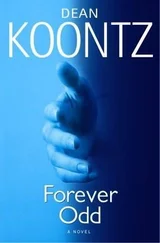
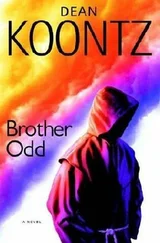
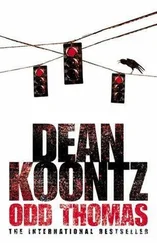



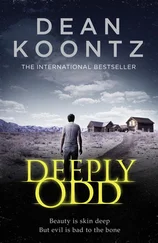
![Dean Koontz - You Are Destined To Be Together Forever [an Odd Thomas short story]](/books/705298/dean-koontz-you-are-destined-to-be-together-foreve-thumb.webp)
